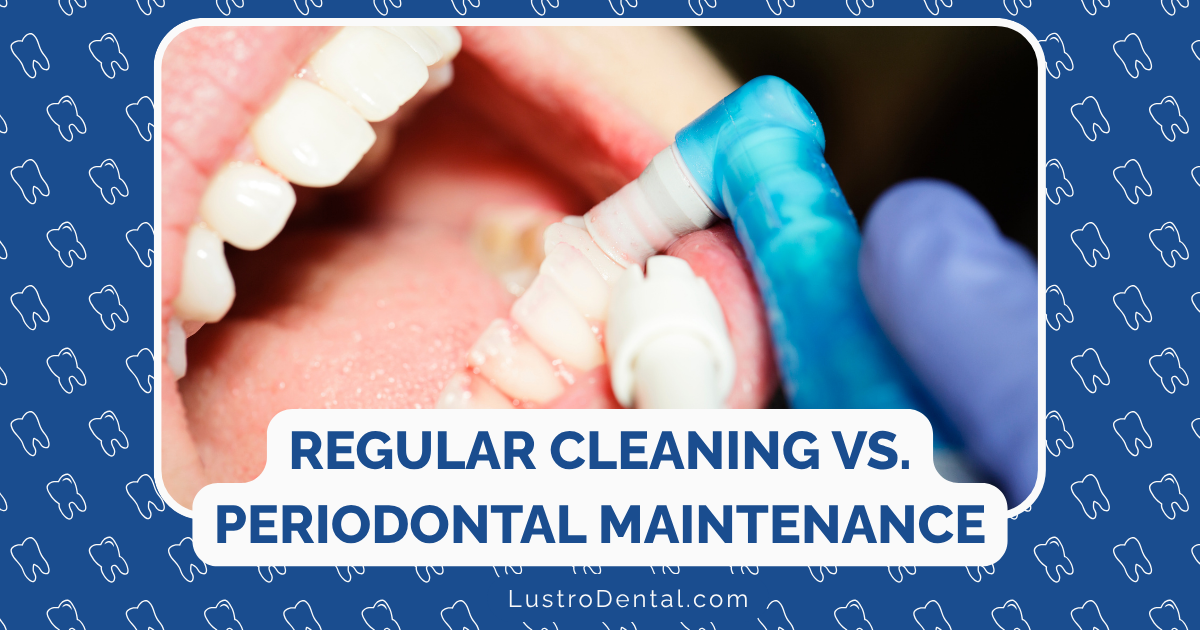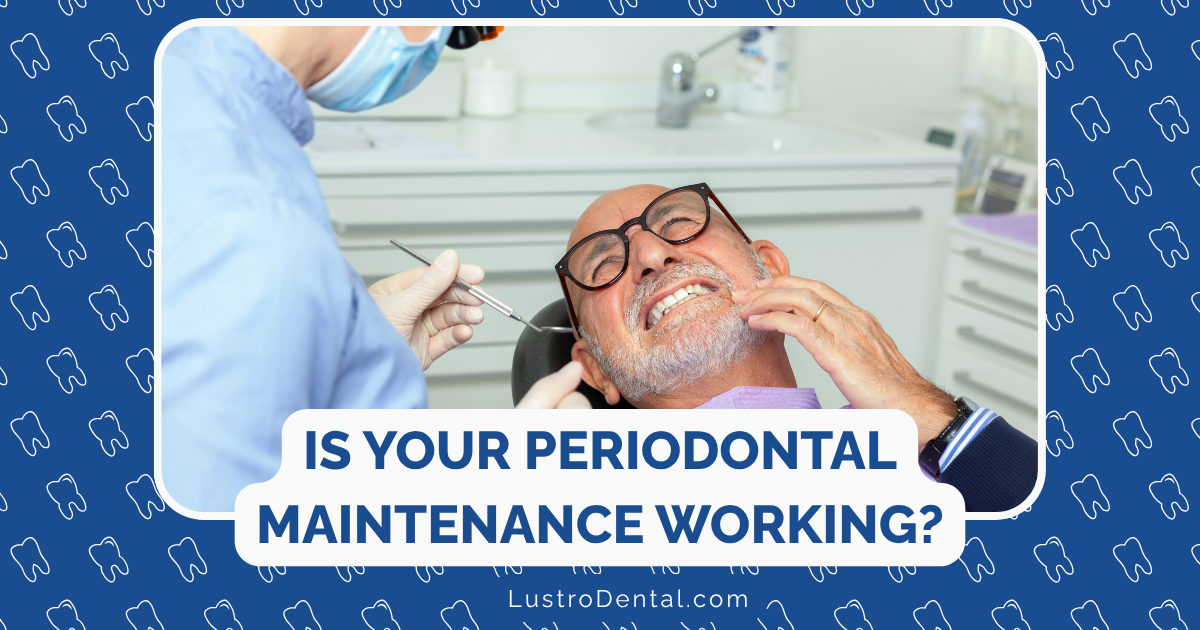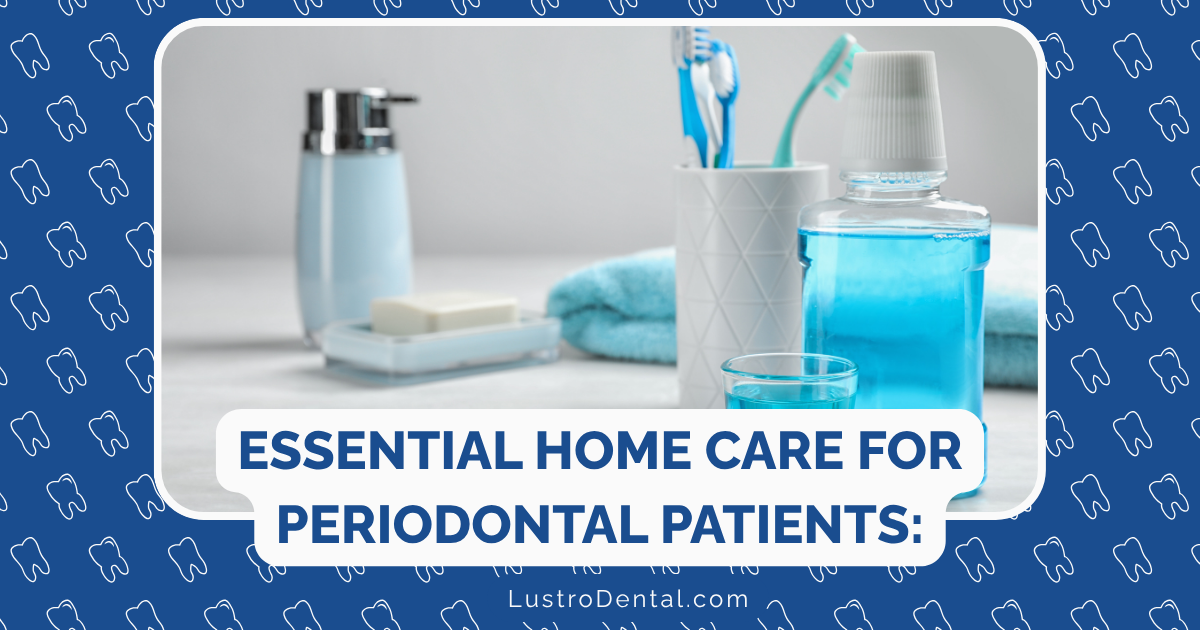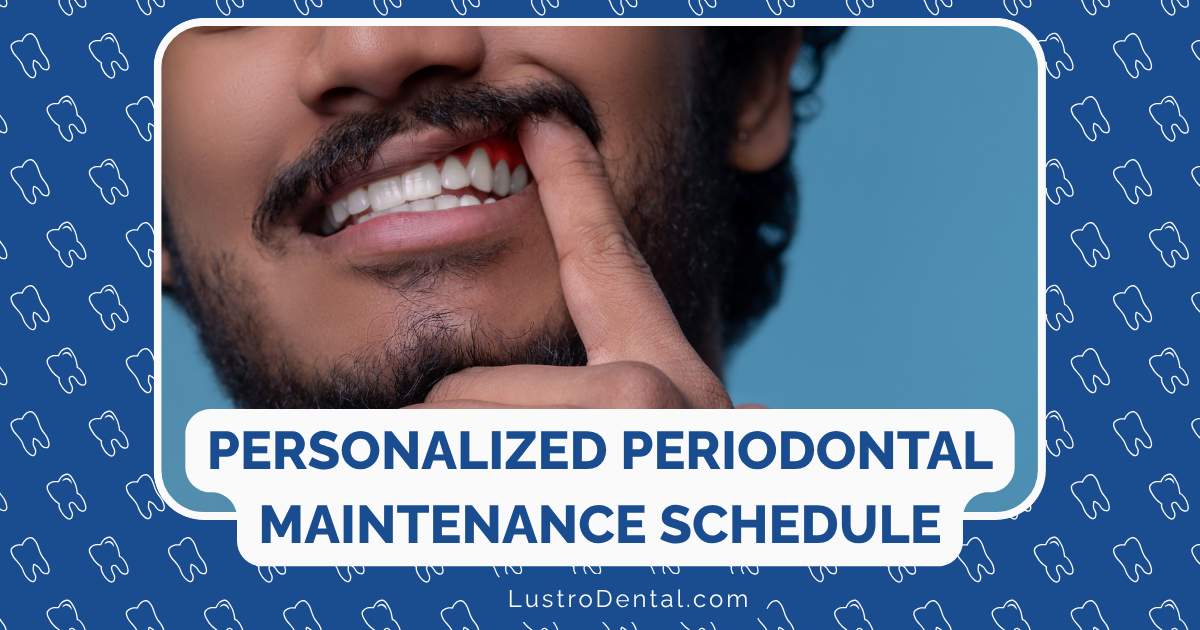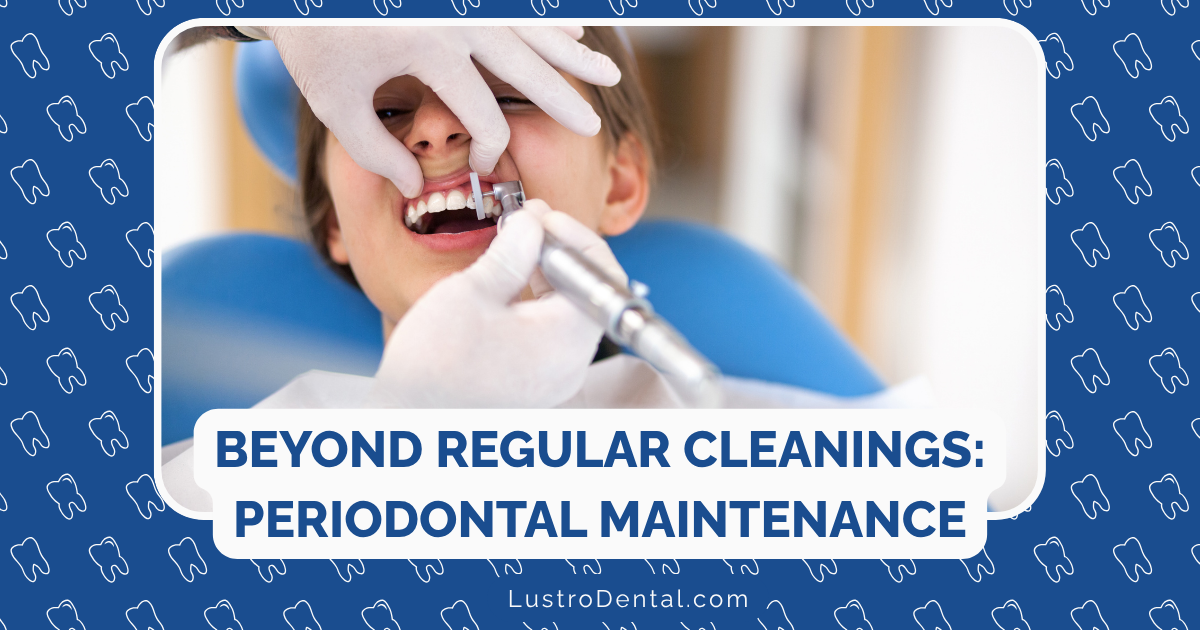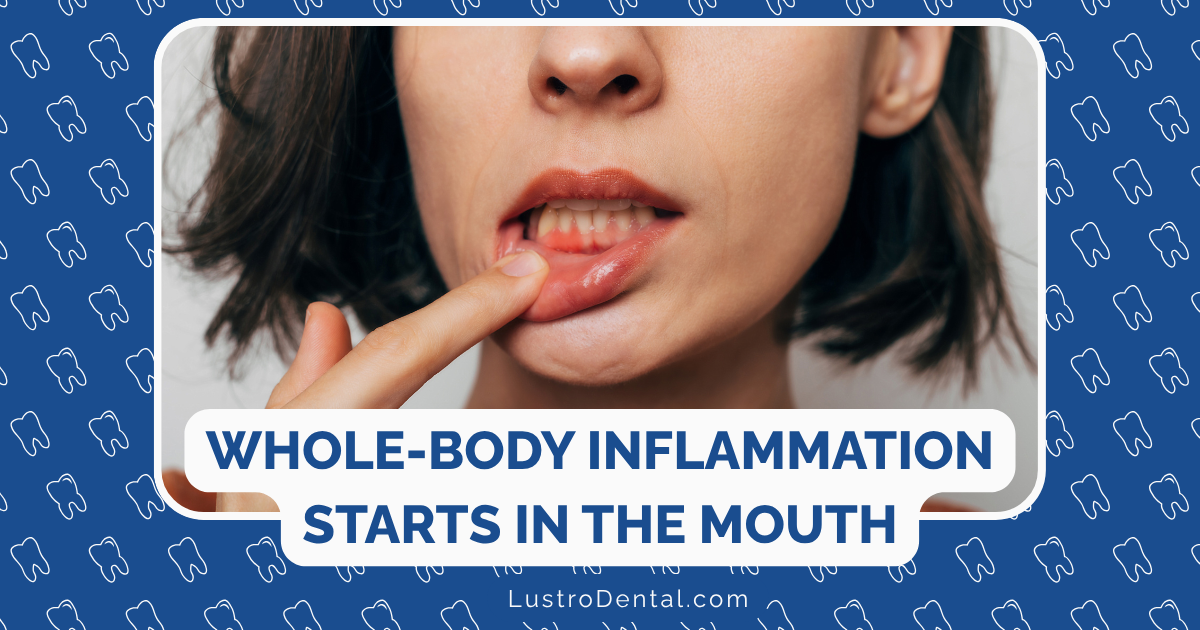Causes of Receding Gums Beyond Brushing Too Hard
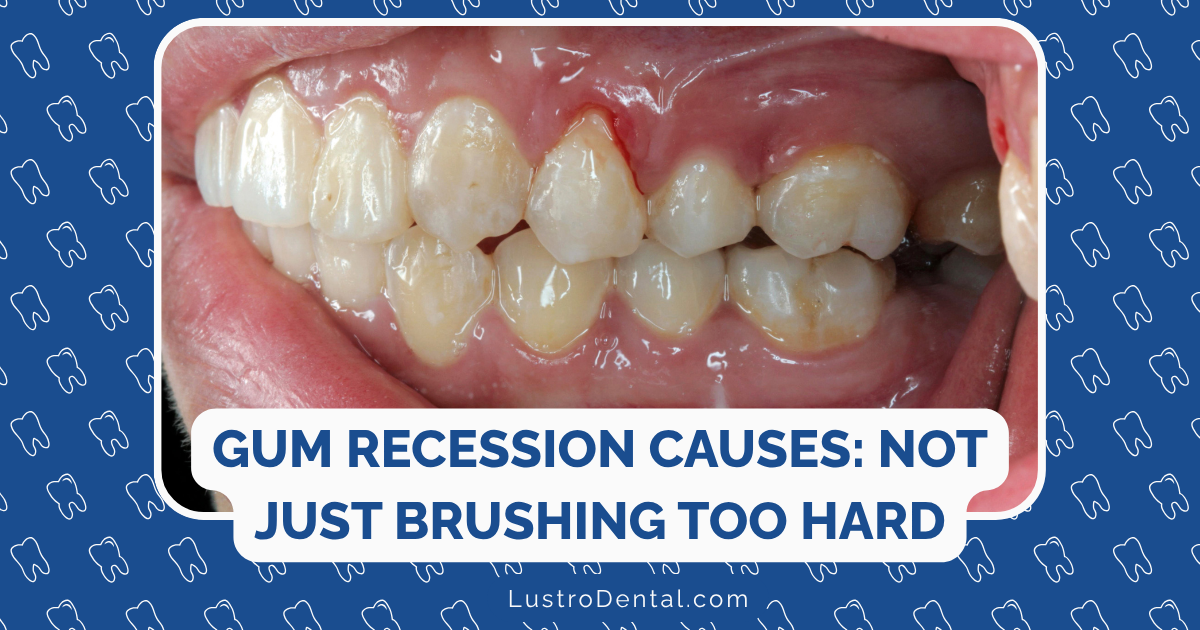
When most people think about receding gums, aggressive tooth brushing is often the first culprit that comes to mind. While it’s true that scrubbing your teeth with too much force or using a hard-bristled toothbrush can damage your gums, this is just one of many factors that can lead to gingival recession.
As someone who’s spent years advocating for comprehensive dental health education, I’ve found that many patients are surprised to learn about the wide range of factors—many beyond their control—that can contribute to this common condition. Understanding these diverse causes is the first step toward prevention and appropriate treatment.
What Exactly Is Gum Recession?
Before diving into causes, let’s clarify what we’re talking about. Gum recession occurs when the margin of gum tissue surrounding the teeth wears away or pulls back, exposing more of the tooth or its root. According to the Dental Update Journal, this condition affects more than 50% of the population across all age groups, with prevalence ranging from 58% to an astonishing 99.7% in some populations.
The severity is typically classified as:
- Mild: Up to 1 mm of recession
- Moderate: 1-3 mm of recession
- Severe: 4 mm and over of recession
Now, let’s explore the less discussed causes that might be affecting your gum health.
Genetic Predisposition: The Hand You’re Dealt
According to research from Cleveland Clinic, genetics plays a significant role in determining your susceptibility to gum recession, regardless of how diligently you care for your teeth.
How Genetics Influences Gum Health:
- Gum Thickness: Some people naturally have thinner gum tissue, which is more vulnerable to recession.
- Tooth Position: Genetically determined tooth alignment can create areas where gums are more susceptible to recession, particularly when teeth are positioned outside the normal arch.
- Jaw Structure: The underlying bone architecture can predispose certain areas to develop dehiscences (areas where bone is naturally missing over tooth roots).
- Immune Response: Genetic variations can affect how your body responds to oral bacteria, potentially leading to more aggressive inflammatory responses.
Dr. Sarah Johnson, periodontist at the University of Michigan, explains: “About 30% of the population may be genetically predisposed to gum disease regardless of how well they care for their teeth. These individuals might need more frequent professional care and specialized home care routines.”
Hormonal Changes: The Invisible Influence
Hormonal fluctuations throughout life can significantly impact gum health, often in ways that aren’t immediately obvious to patients.
Key Hormonal Phases Affecting Gum Health:
1. Puberty
During puberty, increased levels of sex hormones like estrogen and progesterone increase blood flow to the gums and change how gum tissue responds to irritants like plaque. This can cause the gums to become swollen, tender, and more prone to bleeding.
2. Menstruation
Some women experience what’s called “menstruation gingivitis,” with symptoms including swollen, bleeding gums and sores inside the mouth that appear right before their period and clear up once it starts.
3. Pregnancy
According to the National Center for Biotechnology Information, pregnancy can promote an inflammatory response related to gingivitis and periodontitis due to hormonal changes. “Pregnancy gingivitis” affects many expectant mothers, typically beginning in the second month and reaching peak severity in the eighth month.
4. Menopause
The reduction in estrogen that occurs during menopause can lead to multiple oral changes, including:
- Decreased saliva production (dry mouth)
- Thinning of the oral mucosa
- Altered taste perception
- Increased inflammation and susceptibility to gum disease
Dr. Michael Chen, Director of Women’s Oral Health at Boston University, notes: “The hormonal roller coaster many women experience throughout their lives can have profound effects on gum health. Being aware of these vulnerable periods allows for more proactive care during these times.”
Systemic Diseases: The Mouth-Body Connection
The relationship between oral health and overall health is bidirectional—systemic conditions can affect your gums, and gum disease can impact systemic health.
Systemic Conditions Linked to Gum Recession:
1. Diabetes
People with diabetes are at higher risk for gum disease, which can lead to recession. According to a PMC study, individuals with type 2 diabetes are at a higher risk for periodontal disease, and vice versa, indicating a bidirectional relationship.
The mechanism involves:
- Impaired wound healing
- Microvascular changes
- Altered collagen metabolism
- Elevated glucose levels in gingival fluid
2. Autoimmune Diseases
Several autoimmune conditions can directly impact gum health:
- Sjögren’s Syndrome: Causes severe dry mouth, increasing risk of gum disease
- Rheumatoid Arthritis: Shares inflammatory pathways with periodontal disease
- Psoriasis: Associated with higher rates of periodontitis
- Inflammatory Bowel Disease: Connected to increased prevalence of periodontal issues
A 2023 study from the University of Birmingham found that 33% of individuals with gum disease developed autoimmune diseases such as rheumatoid arthritis, type 1 diabetes, and psoriasis.
3. Cardiovascular Disease
The relationship between gum disease and heart disease is well-established. The same inflammatory processes that lead to gum recession can affect blood vessels throughout the body. The Birmingham study identified an 18% increased risk of developing cardiovascular disease in individuals with periodontal disease.
Medications: The Hidden Culprits
Many commonly prescribed medications can contribute to gum recession through various mechanisms.
Medications That Can Affect Gum Health:
1. Medications That Cause Dry Mouth (Xerostomia)
Saliva plays a critical role in protecting your gums by washing away food particles and neutralizing acids. Medications that reduce saliva flow include:
- Antihistamines
- Decongestants
- Antidepressants
- Blood pressure medications
- Parkinson’s disease medications
2. Immunosuppressants
These medications, often prescribed for autoimmune conditions or following organ transplantation, can reduce the body’s ability to fight infections, including those in the gums.
3. Anti-seizure Medications
Drugs like phenytoin can cause gingival overgrowth in some patients, which, while seemingly the opposite of recession, can create deep pockets that eventually lead to recession.
4. Calcium Channel Blockers
These blood pressure medications can also cause gingival overgrowth in some patients.
Dr. Lisa Williams, pharmacist and dental health educator, advises: “Always inform your dentist about all medications you’re taking, including over-the-counter drugs and supplements. This information helps them anticipate potential oral health issues and develop preventive strategies.”
Nutritional Deficiencies: The Foundation of Health
What you eat—or don’t eat—can significantly impact your gum health and contribute to recession.
Key Nutrients for Gum Health:
1. Vitamin C
According to Dr. Juan Carrillo, vitamin C deficiency is a direct cause of gum recession. This essential vitamin:
- Is crucial for collagen production, which gives structure to your gums
- Supports immune function to fight infections
- Has antioxidant properties that protect gum tissue
- Promotes wound healing
Historically, severe vitamin C deficiency (scurvy) was known to cause bleeding gums and tooth loss.
2. Vitamin D and Calcium
These nutrients work together to maintain bone health, including the alveolar bone that supports your teeth. Deficiencies can lead to bone loss, which often precedes gum recession.
3. B Vitamins
B vitamins, particularly folate (B9) and B12, play important roles in cell repair and reducing inflammation.
4. Zinc
This mineral supports immune function and wound healing, both important for maintaining healthy gums.
Stress and Bruxism: The Grinding Problem
Chronic stress affects nearly every system in your body, including your oral health.
How Stress Contributes to Gum Recession:
1. Direct Physiological Effects
According to Grand Rapids Dentists, chronic stress:
- Increases inflammation throughout the body, including in gum tissue
- Weakens the immune system, reducing your ability to fight oral infections
- Can decrease saliva production, leading to dry mouth
2. Teeth Grinding (Bruxism)
Stress is a primary trigger for bruxism, which can cause:
- Excessive force on teeth, leading to gum recession
- Micro-cracks in teeth that can harbor bacteria
- Accelerated wear of enamel
A report from Smile Savers Dentistry notes that symptoms of stress-related bruxism include flattened, chipped, or cracked teeth, tooth pain, and headaches.
3. Neglected Oral Hygiene
During periods of high stress, many people neglect self-care routines, including proper oral hygiene.
Less Common But Significant Causes
1. Abnormal Frenum Attachment
The frenum is a piece of tissue that connects your lips to your gums. According to Healthline, an abnormally high or thick frenum attachment can:
- Pull gum tissue away from teeth
- Expose tooth roots
- Create gaps between teeth
- Make proper oral hygiene difficult
This condition often requires a simple surgical procedure called a frenectomy to prevent ongoing gum recession.
2. Oral Piercings
Lip and tongue piercings can cause significant gum recession through constant trauma to gum tissue. According to ResearchGate:
- Patients with tongue piercings are at an 11 times increased risk of developing lingual anterior gingival recession
- Lip piercings cause more gingival recession compared to tongue piercings
- The recession typically occurs on teeth adjacent to the piercing
3. Orthodontic Treatment
While braces and aligners can correct misaligned teeth, the tooth movement involved can sometimes contribute to gum recession, particularly when:
- Teeth are moved outside the alveolar housing
- Treatment is performed on patients with thin gingival biotypes
- Oral hygiene is compromised during treatment
Studies reported in ResearchGate found buccal gingival recessions in about 20% to 35% of patients after orthodontic treatment.
4. Tobacco Use
Both smoking and smokeless tobacco products significantly increase the risk of gum recession by:
- Restricting blood flow to gum tissue
- Impairing immune function
- Masking symptoms of gum disease (reduced bleeding)
- Interfering with normal healing processes
According to the NCBI, tobacco smoking increases the risk for periodontal diseases 5-20 fold, with an odds ratio of 5.4 between smoking and chronic periodontitis.
Identifying Your Risk Factors
Given the numerous potential causes of gum recession, it’s important to work with your dental professional to identify your specific risk factors. Consider these questions:
- Do you have a family history of gum recession or periodontal disease?
- Are you experiencing hormonal changes due to pregnancy, menopause, or other factors?
- Do you have any systemic conditions like diabetes or autoimmune disorders?
- Are you taking medications that might affect your oral health?
- Do you grind or clench your teeth, especially during sleep?
- Do you have any oral piercings or a high frenum attachment?
- Are you currently undergoing or have you recently completed orthodontic treatment?
- Do you use tobacco products in any form?
Prevention and Management Strategies
While some causes of gum recession are beyond your control, there are still many steps you can take to protect your gum health:
1. Personalized Oral Hygiene
- Use a soft-bristled toothbrush and proper technique
- Consider an electric toothbrush with pressure sensors
- Use interdental cleaners appropriate for your specific needs
- Ask your dentist about specialized products for your risk factors
2. Regular Professional Care
- Maintain regular dental check-ups (every 3-6 months depending on risk)
- Consider periodontal evaluations if you have high-risk factors
- Discuss professional treatments like scaling and root planing when indicated
3. Lifestyle Modifications
- Manage stress through meditation, exercise, or counseling
- Eat a balanced diet rich in vitamins and minerals
- Quit tobacco use
- Consider removing oral piercings
- Use a night guard if you grind your teeth
4. Medical Management
- Work with your healthcare provider to control systemic conditions
- Discuss medication alternatives if current prescriptions are affecting gum health
- Consider hormone replacement therapy during menopause if appropriate
When to Seek Treatment
If you notice any of these signs, consult with a dental professional promptly:
- Teeth that look longer than they used to
- Visible root surfaces
- Increased sensitivity to hot, cold, or sweet
- Notches near the gumline
- Food getting trapped in new areas
- Changes in the appearance of your smile
Conclusion: A Comprehensive Approach to Gum Health
Gum recession is rarely caused by a single factor. More often, it results from a combination of genetic predisposition, systemic health factors, and lifestyle elements. By understanding the diverse causes beyond aggressive brushing, you can take a more comprehensive approach to protecting your gum health.
Remember that gum tissue doesn’t regenerate naturally once lost, making prevention and early intervention crucial. Work closely with your dental team to develop a personalized strategy based on your specific risk factors and needs.
Have you noticed signs of gum recession? What factors beyond brushing might be contributing to your situation? Share your experience in the comments below.


